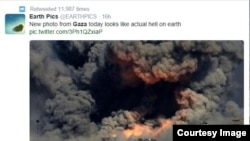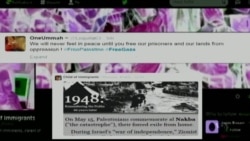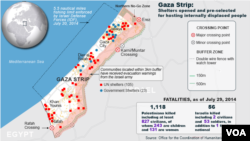Maysoon Khatib's Facebook page is usually devoted to fun-filled images and anecdotes detailing her sometimes harried life as a mother of four children.
But lately, the Kentucky woman's social media posts have taken a somber turn. Instead of snapshots of her kids at summer camp, Khatib is sharing urgent messages about the destruction thousands of miles away in Gaza.
"When the bombing of Gaza began, I had two directions I could move in," said Khatib, who was born in Cleveland, Ohio, to a Palestinian father and a Brazilian mother. "I could act as if nothing is going on and post about the antics of my kids and my day, or use Facebook in a more constructive manner. I opted to do the latter."
Watch related video by VOA's Ayesha Tanzeem
Online war of words
Khatib is not alone.
Social media platforms have been flooded with conflicting opinions and information since Israel's offensive in Gaza began July 8.
The Israeli military says it has hit more than 4,100 sites in Gaza and that 1,566 of those sites were connected to rocket-launching. The military said 2,670 rockets and mortars have been fired toward Israel during that time.
More than 1,250 Palestinians have been killed, most of them civilians, according to the Gaza-based health ministry. Officials on the Israeli side report 53 soldiers and three civilians have been killed.
Those numbers have sparked impassioned social media commentary on both sides, but it's difficult to calibrate whether the online war of words is having an impact.
A Gallup poll conducted July 22-23 found the American public is almost evenly split on whether Israel's actions against Hamas are justified; with 42 percent saying the actions are justified while 39 percent believe they are not. The difference between the two opinions is within the poll's margin of error of four percentage points.
The survey also found that a wide majority of young people – 51 percent – between the ages of 18 and 29 believe Israel's actions in Gaza are not justified, as compared to 25 percent who said the Jewish state's actions are justified.
Public engagement
Jed Shein, digital director of Israel's embassy in the United States, says he hasn't seen any evidence social media is negatively impacting public opinion against Israel in the U.S. and Europe.
"The people willing to comment and react on social media are the people that maybe are on the broader ends of each spectrum," he said. "The information that you might see on Twitter and on Facebook isn't necessarily totally reflective of the broader general opinion."
Nonetheless, Israel recognizes the importance of engaging in social media as part of its broader public diplomacy efforts.
"We're looking to reach out and engage with the public," Shein said. "Where are they getting their news and information? Can we meet them at that place and really make sure they understand where we're coming from?"
The PLO Delegation in Washington also maintains a social media presence, providing updates on its website and through Facebook and Twitter.
"We do have a social media presence and we are active," said a staff member. "We want to send out the message. We want to increase awareness, to give our side of the story."
Humanizing with real-time information
However, instead of influencing public opinion, the conflicting voices crowding onto social media could end up drowning each other out.
"I don't think social media users are making any great difference on the discourse on the Israel-Palestinian conflict," said Anand Varghese, who specializes in technology and peacebuilding at the United States Institute of Peace, a nonpartisan federal institution created and funded by the U.S. Congress. "The conversation is just as polarized and, on the margins, just as hate filled."
Varghese sees social media's real value in its role as an arm of a larger media infrastructure that's helping to humanize the issue. He points to the recent online publication of names of both the Palestinian and Israeli dead as a positive step.
"Real-time information from the field at such a granular level, that is something that has completely changed," he said. "When you see a picture of a Palestinian child who was killed, or of Israeli families tweeting in relief that their loved one wasn't killed, these are emotions we can identify with. It feels real. Whereas, so much of the other information we get from Gaza and Israel feels abstract."
Visual narrative
Those pictures of the death and destruction in Gaza are adding to a visual conversation that challenges the traditional Israeli narrative of Palestinians as terrorists and of associating all Palestinians with Hamas, according to social media expert Laila Shereen Sakr.
A PhD candidate in media arts and practice and researcher at the Annenberg Innovation Lab at the University of Southern California, Sakr created a massive database of Arabic-language tweets during the Arab Spring. She used a computer program to aggregate data and identify patterns, and was lauded by the U.S. State Department for correctly predicting the fall of Tripoli.
Sakr says Instagram, the photo and video sharing platform, is the most active social platform in relation to Gaza right now.
"We are witnessing a shift in the discourse on Palestinians," said Sakr. "There's a movement to humanize them a little bit more and to recognize that they are being victimized."
Virtual body politic
While Sakr believes social media is impacting the Israel-Palestine conversation, she isn't certain where it will all lead.
"We are seeing the emergence of a virtual body politic," she said. "It has made an impact on the discourse, but we don't know whether it will have an impact on the outcome of the discourse."
Back in Kentucky, Khatib has a clear idea of what she hopes will result from her active social media presence.
"My goal is for my non-Arab friends to be exposed to what's going on so they can have an open heart," she said. "Ultimately, I hope they walk away with the understanding that there are two sides to every story."







